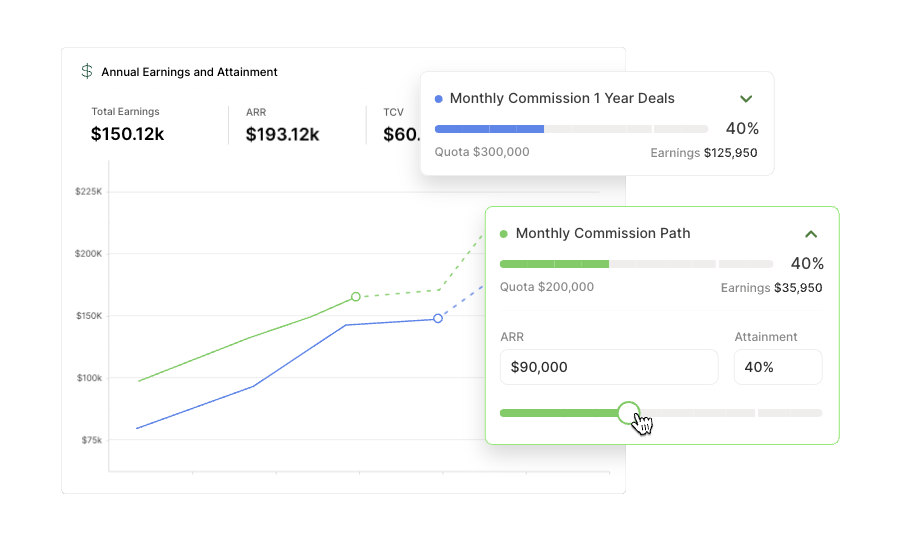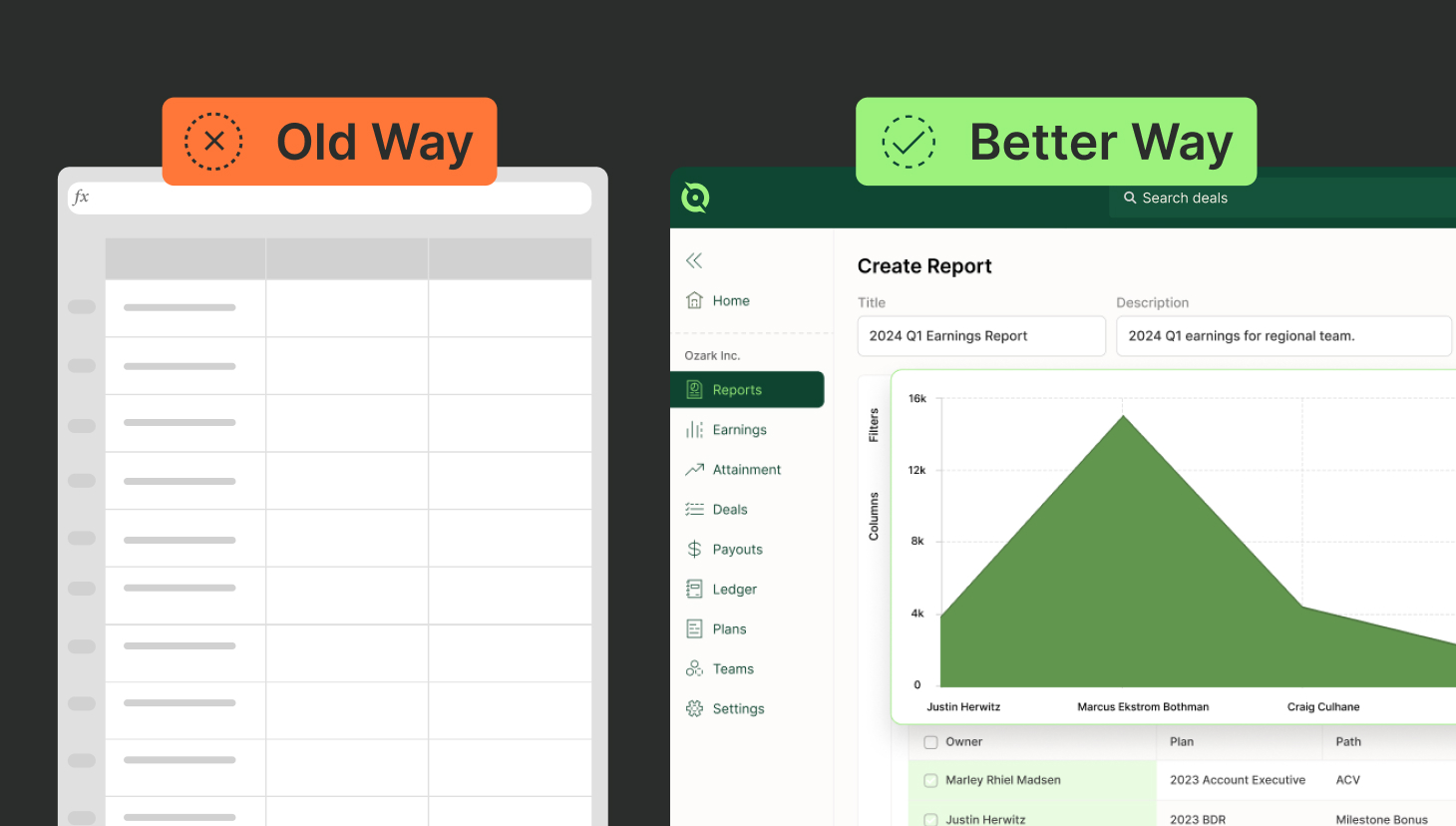Artificial intelligence remains in.
Adoption rates for companies using AI more than doubled from 2017 to 2022, according to McKinsey. Moreover, amongst individual users, 71% reported they had at least some exposure to generative AI following its entrance into the mainstream over the past two years.
Various functions of organizations are leveraging AI to streamline operations, boost efficiency, and improve accuracy. Use cases range from AI-powered customer service chatbots, automated manual sales tasks, and lead scoring automation to automated candidate screening by HR and security monitoring for cybersecurity departments. And, in finance, we see this emerging technology used for data analysis, fraud detection, forecasting, and compliance monitoring.
But there’s so much more that finance can do with AI to grow more efficient in their roles.
In this blog, we will share how AI in finance teams helps to improve accuracy and security, and more.
Manage Sales Compensation Effectively
Automate commission calculations and plan verification, manage discrepancy flagging, and set payout elgibility schedules with QuotaPath.
Learn more10 Ways Teams are Using AI in Finance
Teams are using AI in finance in a multitude of ways.
As the technology evolves, financial professionals continue to find innovative applications for artificial intelligence that enhance decision-making, streamline operations, and drive efficiency across the industry. Below, we’ll explore 10 compelling use cases demonstrating how AI transforms the finance sector.
These examples range from automating routine tasks to predicting market trends with remarkable accuracy, showcasing the versatility and potential of AI-driven solutions in the financial world.
Whether you’re a financial analyst, investor, or simply intrigued by the intersection of finance and technology, these real-world applications of AI will stimulate your imagination and inspire new possibilities.
10. Risk assessment
Banks and loan apps are already turning to AI for smarter financing. Machine learning algorithms crunch the numbers, assess risk, and personalize offerings faster and potentially fairer than traditional methods.
9. Automated reporting
Software powered by AI eliminates manual data compilation and reconciliation by automating financial reports and statement generation as well as distribution on a scheduled basis.
8. Fraud detection, management, and prevention
Humans are inefficient and error-prone when discerning between normal versus abnormal or suspicious behavior for fraud detection. AI tools efficiently analyze real-time data to accurately detect potentially fraudulent behavior and notify relevant parties for further review.
7. Improving financial workflows
Automate approval workflows for purchase orders or expense reports with AI-powered software. This reduces delays, increases collaboration, and ensures timely processing.
6. Intelligent data entry
AI-driven automation reduces error-prone, time-consuming manual data input, minimizing the risk of entry mistakes and miscalculations.
5. Forecasting future trends
AI tools process large volumes of historical, industry, and company-specific data to generate predictive models. Finance departments minimize risks by using this capability for forecasting, budgeting, and resource allocation decisions.

Model Your Compensation Strategy
QuotaPath’s new Plan Performance Modeling tool gives Finance and Revenue leaders insights they to analyze and predict the cost and performance of comp plans.
Learn More4. Compliance monitoring
Finance has many regulations to adhere to. AI reduces the risk of regulatory violations and penalties by automatically recording designated financial transactions and activities and performing compliance checks.
3. Cost optimization
AI is used to analyze historical expenditures, market conditions, and expense data to identify cost containment opportunities.
2. Generating real-time insights
Real-time financial performance insights from enhanced reporting are displayed on AI-powered dashboards for easy reference and decision-making.
1. Data analysis
Finance teams and financial services organizations leverage AI tools to process the significant amount of data they manage. These platforms identify patterns, trends, and insights for better data-driven decision-making to manage credit, calculate risk, and select investments.
Best AI Tools for Finance Teams
Ready to start implementing AI in fiance?
Figuring out which apps to consider first can feel overwhelming. Therefore, in this section, we’ve identified a selection of popular and highly effective tools designed specifically for finance teams looking to harness the power of AI.
These tools have been handpicked for their ability to streamline financial processes, enhance data analysis, and improve decision-making. Whether you’re a financial analyst, a CFO, or part of a finance team, these AI tools can provide valuable support in your daily operations.
Booke.AI
Booke employs AI automation to help finance teams with bookkeeping and accounting tasks. This tool corrects coding errors and uncategorized transactions while improving client communication and streamlining month-end close.
Domo
Domo seamlessly integrates diverse data sources to merge them into user-friendly dashboards designed for business decision-makers. This use of AI in finance enables teams to create a single dashboard that incorporates information from sources like Excel, Salesforce, Workday, and numerous others.
Nanonets
Nanonets Flow is a solution that uses AI in finance to streamline processes, increase efficiency, and improve results. This tool extracts data from documents like invoices and receipts, automates processes, manages workflows, and integrates with your current financial and accounting platforms.
How to Start Using AI in Finance
The shift to AI in finance has begun. It’s time to jump in so you can start enjoying greater efficiency and insights.
This may seem intimidating, so break it down into manageable steps to facilitate the process. Follow these best practices for beginning to implement AI in your finance practice.
1. Educate yourself
Expand your understanding of AI and its potential use cases and limitations in finance to help hone in on how to get the greatest benefit for your department. You can take a course, contact knowledgeable colleagues, attend industry conferences and seminars, or hire a consultant.
2. Identify use cases
Determine which aspects of your finance practice will benefit from AI. Then prioritize them based on importance and set clear, measurable goals for your initiative.
3. Assess your systems and resources
Before you start using AI in finance, evaluate your data infrastructure, quality, and completeness to avoid issues. Then determine if your staff is equipped to use AI tools, if they’ll require training, if you’ll need to hire additional employees, or if you should use an outside vendor.
Once you’ve completed these preliminary steps, you can select your AI tools and work toward implementation.
Streamline commissions for your RevOps, Finance, and Sales teams
Design, track, and manage variable incentives with QuotaPath. Give your RevOps, finance, and sales teams transparency into sales compensation.
Talk to SalesStart using AI in finance
The use of AI in finance is on the rise. Its benefits include increased efficiency and accuracy, reduced risks, cost containment, and more informed decision-making.
Don’t be left behind by the competition. It’s time to start using AI in finance. This doesn’t need to be difficult. Educate yourself, identify use cases that best suit your requirements, assess your systems and resources, and select your first AI tools.
See how QuotaPath can help Finance teams model compensation plans and draw insights to predict and measure the performance of their plans—schedule time with our team to learn more.



